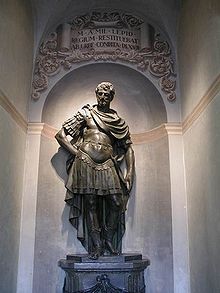Marcus Aemilius Lepidus (consul 187 BC)
| Marcus Aemilius Lepidus | |
|---|---|

Statue of Marcus Aemilius Lepidus in the City Hall of Reggio Emilia, which he founded.
|
|
| Consul of the Roman Republic | |
|
In office 189 BC – 189 BC |
|
| Preceded by | Gaius Livius Salinator and Marcus Valerius Messalla |
| Succeeded by | Quintus Marcius Philippus and Spurius Postumius Albinus |
| Consul of the Roman Republic | |
|
In office 175 BC – 175 BC |
|
| Preceded by | Gnaeus Cornelius Scipio Hispallus and Quintus Petillius |
| Succeeded by | Spurius Postumius Albinus Paullulus and Quintus Mucius Scaevola |
| Pontifex Maximus | |
|
In office 180 BC – 152 BC |
|
| Preceded by | Publius Licinius Crassus |
| Succeeded by | Publius Cornelius Scipio Nasica |
| Personal details | |
| Born | c. 230 BC Rome, Roman Republic |
| Died | 152 BC Rome |
| Religion | Roman Paganism |
Marcus Aemilius Lepidus (c. 230 – 152 BC) was a twice Roman consul, Pontifex Maximus, Censor and Princeps Senatus. A scion of the ancient Patrician gens Aemilia, he was most likely the son of Marcus Aemilius Lepidus, with his brothers being Lucius and Quintus.
According to Polybius, Lepidus was 'the handsomest man of his time,' as well as, in the words of Diodorus, being 'gifted with superior intelligence'. Combining these qualities with an impeccable aristocratic birth, political skill and a reputation for bravery, Lepidus soon rose to become one of the leading Romans of his generation.
He was the great-grandfather of Marcus Aemilius Lepidus the Triumvir.
Although he was only 15 at the time of the Battle of Cannae in the 2nd Punic War, it was nevertheless then that Lepidus first distinguished himself. If not at fateful Cannae itself, then in one of the battles closely following it, the young Lepidus rushed into the fight and saved the life of one of his countrymen by killing his assailant. For this act of gallantry, the Senate ordered an equestrian statue of the young man erected on the Capitoline to commemorate the deed. It was a remarkable honour for one so young and one that marked Lepidus out for the future greatness he would achieve.
Later that year, 216 BC, Lepidus' father, Marcus Aemilius Lepidus, who had been an augur and twice consul, died and Marcus and his two brothers staged funeral games for three days in his honour.
In 201 BC, Lepidus and two colleagues were sent as ambassadors by the Senate to King Ptolemy of Egypt, both to announce Rome's victory over Carthage and ensure that Rome's alliance with Egypt would continue through the coming war with Philip of Macedon, which the Romans were preparing for.Ptolemy was still only a young boy at this time and there is a tradition that Lepidus for a time acted himself during his stay in Egypt as the King's guardian and for a time governed the country. This appeal to Rome for the Senate to send a regent to them was, according to Justin, made by the Egyptians themselves.
...
Wikipedia
